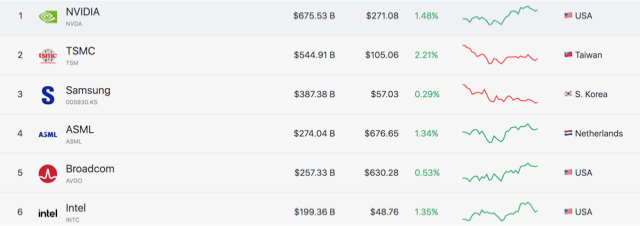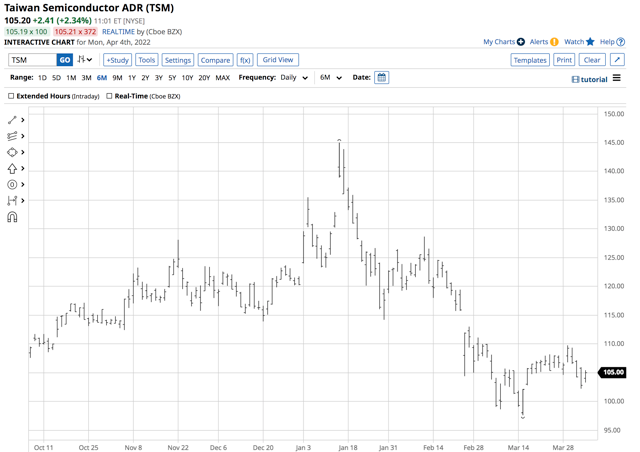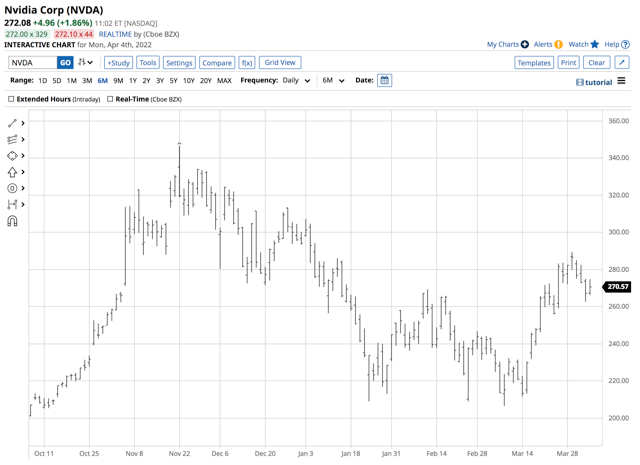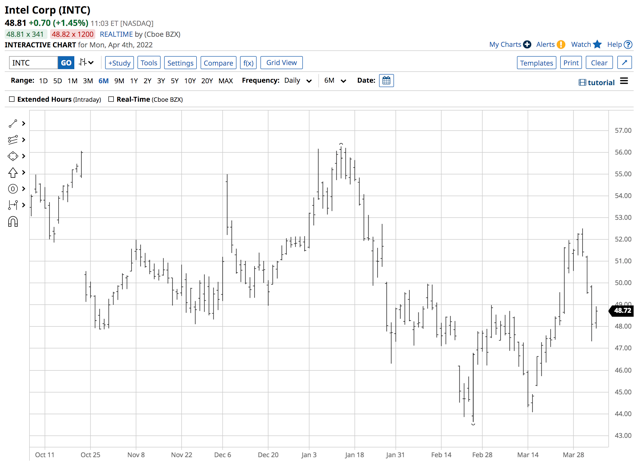This article was written exclusively for Investing.com
- Shortage of semiconductors
- Russian invasion has ramifications for China, Taiwan
- Taiwan Semiconductor: leading semiconductor manufacturer
- Sanctions are a warning
- Intel and others may need to take up slack
Semiconductor material has an electrical conductivity value falling between that of a conductor, such as a metallic copper, and an insulator, like glass. Its resistivity, or electrical resistance, falls as its temperature rises; metals react oppositely.
Anything that's computerized or uses radio waves depends on semiconductors. Semiconductors are required for electronic devices, including chips, diodes, transistors, and integrated circuits. The chips make computers, smartphones, appliances, gaming hardware, and medical equipment work. These chips are also necessary for critical functions in cars, including sensing, safety features, power management, displays, and vehicle control.
Silicon is the most common raw material for semiconductors because of its high-temperature stability and abundance in nature. In short, semiconductors are essential commodities for an array of products used by both consumers and businesses.
Shortage Of Semiconductors
The global pandemic caused supply chain bottlenecks that led to a semiconductor shortage. Chip prices increased, pushing costs for electronic devices higher. While leading companies like Apple (NASDAQ:AAPL) and Samsung (OTC:SSNLF) began stockpiling chips early, many automobile manufacturers experienced production delays. Some estimates say the chip shortage cost the US economy just under a quarter of a trillion dollars in 2021.
Russian Invasion Has Ramifications For China, Taiwan
Over the past two years, the world went from one global crisis to the next. The 2020 COVID-19 pandemic gave way to the first major war in Europe since World War II. On Feb. 4, at the opening ceremonies of the Beijing Olympics, Chinese President Xi Jinping and Russian President Vladimir Putin shook hands on a “no-limits” support agreement that set the stage for Russia’s Feb. 24 invasion of Ukraine.
Fears are the alliance could also set the stage for Chinese reunification with Taiwan. Just as Russia considers Ukraine western Russia, China believes Taiwan is part of China, while the US and Europe consider both countries to be sovereign nations.
The “no-limits” deal could have far-reaching geopolitical consequences over the coming months and years.
Taiwan Semiconductor: Leading Semiconductor Manufacturer
Russia’s invasion of Ukraine has impacted energy and agricultural markets. Sanctions and war in Ukraine have caused massive price volatility in crude oil, natural gas, coal, wheat, corn, nickel and other commodities.
Semiconductors are themselves a type of commodity, and Chinese aggression against Taiwan could have similar consequences in the chip arena, as Taiwan Semiconductor Manufacturing (NYSE:TSM), which is headquartered in Hsinchu City, Taiwan, is a leading international chipmaker.

Source: Companiesmarketcap.com
As the chart shows, Taiwan Semiconductor is the world’s second leading semiconductor company by market cap. Apple, the world’s leading company by market cap, is TSM’s largest client, accounting for a significant percentage of the chipmaker's revenue.
Taiwan produces the most chips worldwide since Taiwan Semiconductor controls 51% of the global chip market.
Sanctions Are A Warning
War in Ukraine has turned agricultural acreage into battlefields, endangering world food supplies. Sanctions on Russia threaten energy shortages in Europe and other regions.
If the Chinese government decides to invade Taiwan, it would likely cause chip manufacturing to slow or even halt. Sanctions could cause an even more significant chip shortage than experienced during the global pandemic.
Moreover, deteriorating US-Chinese relations could cause an export ban on chips, forcing prices higher, additionally limiting supplies.
Intel And Others May Need To Take Up Slack
US chip companies, including NVIDIA (NASDAQ:NVDA) and Intel (NASDAQ:INTC), will need to increase chip production to protect against a future shortage caused by the geopolitical landscape.

Source: Barchart
Since the end of 2021, shares of TSM fell from $120.31 on Dec. 31 to close at $104.79 on Apr. 4, a decline of almost 13% decline.

Source: Barchart
At the same time, shares of NVDA dropped 7% from $294.11 to close at $273.60 on Apr. 4.

Source: Barchart
Shares of INTC fell 4.5% from $51.50 on Dec. 31 to close at $49.20 on Apr. 4.
TSM has underperformed competitive chipmakers since the end of 2021. The potential for geopolitical turmoil in Taiwan is likely weighing on the shares.
US chipmakers and their global peers could have to ramp up production as supply risks in the semiconductor market are rising.
